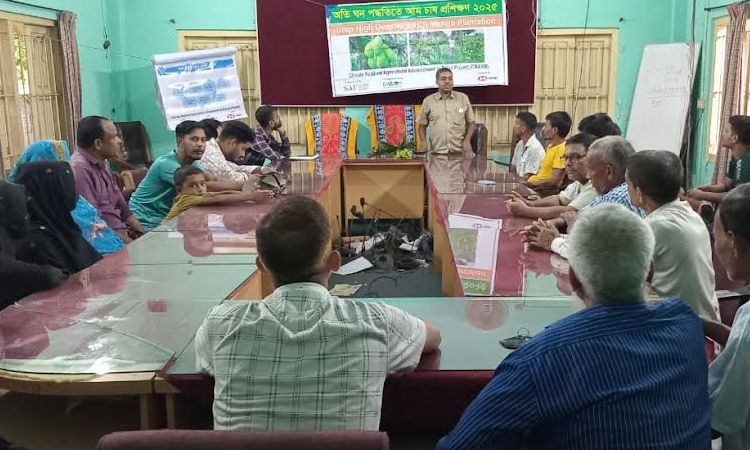News Flash

By Md Aynal Haque
RAJSHAHI, Sept 22, 2025 (BSS) - Grassroot farmers in the Barind area are gaining knowledge of climate-smart agricultural practices, which aim to increase irrigation efficiency, enhance farm productivity, and expand local agribusiness opportunities.
Farmers are being trained to improve irrigation water use efficiency and utilize fallow land through climate-smart technologies. These efforts are intended to drive innovation, strengthen value chains, and boost export potential.
Special emphasis is being placed on creating employment opportunities and empowering women, ethnic minorities, and youth in agriculture through the Agricultural Entrepreneurship Programme, while building partnerships with public and private sector stakeholders.
Under the programme, more than 25,000 farmers are adopting climate-smart farming methods, receiving guidance on how to implement these practices for profitable outputs in the Barind region.
By connecting a strong network of public-private stakeholders, targeted farmers are learning how to boost irrigation efficiency and farm productivity, while also accessing and expanding local agro-business opportunities.
The conventional farming system faces numerous challenges, particularly due to the adverse effects of climate change, making timely interventions essential. Farmers in the Barind region - comprising Rajshahi, Chapainawabganj, and Naogaon districts - experience water shortages for crop cultivation, especially during the dry Boro season.
To address this, Alternate Wetting and Drying (AWD) technology, a water-saving rice cultivation method involving periodic draining and re-flooding of fields, is being promoted. This technique significantly reduces irrigation water use while maintaining Boro rice yields and also lowers methane emissions by 30-50%.
The alarming impact of climate change has severely affected agriculture and its diversity, posing a real threat to food production and public health.
To promote climate-smart farming, the project "Climate Resilient Agricultural Advancement in Barind (CRAAB)" is being implemented in Paba Upazila of Rajshahi, Sadar Upazila of Chapainawabganj, and Niamotpur and Potnitola Upazilas in Naogaon.
The project is led by DASCOH Foundation, technically supported by the Sustainable Agriculture Foundation Bangladesh (SAF Bangladesh), and financially backed by the Hongkong and Shanghai Banking Corporation Limited.
Chief Executive Officer of DASCOH Foundation, Akramul Haque, said the initiative promotes climate-smart technologies to increase water use efficiency, enhance farm productivity, and utilize fallow land. He added that the project also empowers women and youth through job creation and agro-entrepreneurship programmes, while fostering partnerships for innovation, value chain strengthening, and export promotion.
Within the project area, there are 250 AWD demonstration plots, 48 ultra-high-density mango plantation plots, 65 homestead vegetable garden plots, and 58 vermi-compost technology demonstration plots. Additionally, 27 farmers' field days and 25 farmers' hubs are being conducted at the field level.
The project aims to bring 12,000 farmers under the farmer entrepreneur hub network, with 25 farmers in each hub. Five supply chains are being developed for local and export markets. Each entrepreneur is expected to generate an annual income of about 3,600 US dollars, alongside two to five price advantages for better market linkage.
Akramul Haque emphasized that integrated efforts by government and non-government organizations are crucial to protecting agriculture in the Rajshahi Barind area, where livelihoods are largely dependent on farming.
Helal Uddin, a beneficiary farmer from Sajaldanga village under Niamatpur Upazila, said the training was very helpful. "AWD will help us improve our production system, protect groundwater, and contribute to environmental sustainability," he added.
Shyamoli Begum, another farmer from Paba Upazila, said, "Now there is no nutritional deficiency in my family. I am very happy. I earn about Taka 1,500 every month from my domestic garden and am saving money for the future."
CRAAB Project Coordinator Sanjoy Sarker noted that there are enormous opportunities to increase acreage of low-water-consuming crops like wheat, black gram, sesame, lentil, maize, and pulses in the high Barind tract. He stressed the need to make agriculture profitable and commercialized to promote sustainable farming of high-value crops.
Sarker added that encouraging farmers to cultivate various cereal crops and vegetables instead of only Irri-Boro paddy on dry land is essential to mitigate water stress. Large-scale promotion of less-water-consuming crops could effectively address water scarcity.
He further said that all authorities and farmers must work together to promote climate-smart conservation technologies. Farmers in the Barind area require timely training and motivation to cultivate less-irrigated crops and reduce pressure on groundwater.
Concerted efforts by government and non-government organizations are vital to mitigating the adverse impact of climate change in the region, including its drought-prone Barind area.